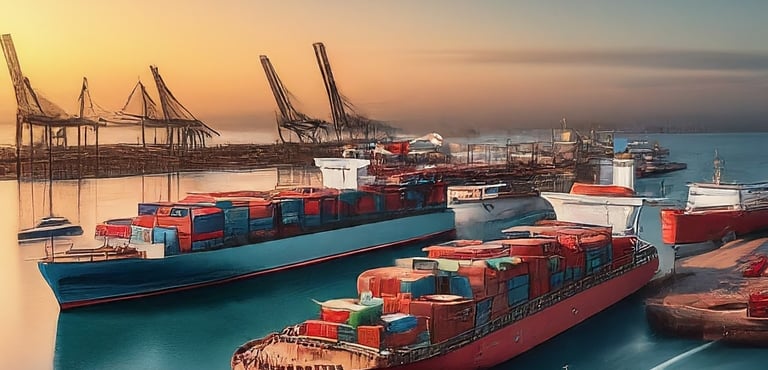The Vital Role of Shipping Lines: A Comprehensive Guide
This page unveils the critical world of container liner shipowners, the driving force behind the global movement of goods. We'll explore who they are, their core functions, operational methods, a glimpse into the industry's future, and showcase some of the top players on the global stage.
Who Are Container Liner Shipowners?
Container liner shipowners are the unsung heroes of international trade. They are companies that:
Own and Operate Container Ship Fleets: These specialized vessels feature standardized container slots for efficient cargo transportation across vast distances.
Navigate Fixed Routes and Schedules: Shipowners establish reliable and predictable cargo movement by operating on predetermined routes with regular schedules between ports.


What Do Container Liner Shipowners Do?
Container liner shipowners play a pivotal role in facilitating global trade. Their key responsibilities encompass:
Fleet Management: They oversee the construction, maintenance, and overall operation of their container ship fleets.
Route Planning and Scheduling: Shipowners meticulously plan efficient routes and set fixed schedules to guarantee reliable cargo movement.
Cargo Handling: Ensuring the safe loading, unloading, and transportation of containers at ports falls under their purview.
Negotiating Freight Rates: Shipowners negotiate shipping costs with freight forwarders and shippers based on factors like cargo type, destination, and market conditions.
Collaboration: They may collaborate with other container liner companies through alliances or joint ventures, optimizing resources and expanding service offerings.
How Do Container Liner Shipowners Operate?
Container liner shipping is a complex ecosystem with various stakeholders. Here's a simplified breakdown:
Shipowners: Own and operate the container ships.
Shipping Lines (Carriers): Companies that manage the transportation of goods using container ships (may or may not be the same as the shipowner). They interact with shippers and freight forwarders.
Freight Forwarders: Act as intermediaries, handling logistics, documentation, and customs clearance for shippers.
Shippers: Companies that export or import goods using container shipping.
The Future View: A Glimpse into Container Liner Shipping's Evolution
The container liner shipping industry is constantly adapting. Here are some key trends shaping its future:
Giant Leaps in Ship Size: Shipowners are investing in ever-larger container ships to maximize economies of scale.
Sustainability at the Forefront: Emphasis is placed on reducing emissions and adopting cleaner technologies like alternative fuels for a greener future.
Digitalization and Automation: Emerging technologies like AI will play a more prominent role in optimizing operations and enhancing efficiency.
Shifting Trade Dynamics: Evolving geopolitical landscapes and fluctuating trade patterns will influence shipping routes and demand.
Top Container Liner Shipowner Companies Worldwide:
The container liner shipping industry is a concentrated market with a few dominant players. Here are some of the leading companies across the globe (in no particular order):
MSC Mediterranean Shipping Company (Switzerland): A major player with a strong global presence in container shipping.
A.P. Moller-Maersk (Denmark): A global leader in container shipping and logistics.
CMA CGM Group (France): A leading company offering container shipping and logistics services.
COSCO Shipping (China): A significant player in container liner operations, this major Chinese state-owned shipping conglomerate.
Hapag-Lloyd (Germany): A leading German container liner shipping company with a global network.
Ocean Network Express (Singapore): A joint venture formed by three Japanese shipping lines: Kawasaki Kisen Kaisha, Mitsui O.S.K. Lines, and Nippon Yusen Kaisha.
Evergreen Marine Corporation (Taiwan): A major Taiwanese container liner shipping company.
Yang Ming Marine Transport Corporation (Taiwan): Another prominent Taiwanese container liner shipping company.
ONE (Japan): A joint venture established by three Japanese shipping lines: Nippon Yusen Kaisha, Mitsui O.S.K. Lines, and Kawasaki Kisen Kaisha.
Remember, this is not an exhaustive list. Several regional and niche players also operate in the container liner shipping industry.
Conclusion: Container liner shipowners are the backbone of global trade, ensuring the smooth and efficient movement of goods worldwide.
By understanding their role, functions, and future prospects, you gain valuable insights into the dynamic and ever-evolving world of containerized shipping.


